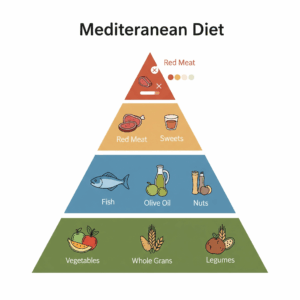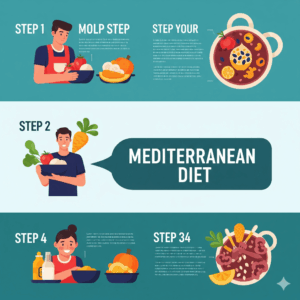Introduction
The Mediterranean diet has gained worldwide recognition as one of the healthiest eating patterns, backed by decades of research. Originating from countries that border the Mediterranean Sea, this diet emphasizes fresh, whole foods and healthy fats that nourish the body and protect against chronic diseases. From reducing the risk of heart disease to supporting weight management, the Mediterranean diet is more than just a meal plan—it’s a lifestyle shift that can boost both physical and mental well-being.
What Is the Mediterranean Diet?
The Mediterranean diet focuses on plant-based, nutrient-dense foods, with a balance of proteins, healthy fats, and whole grains. Unlike restrictive diets, it encourages moderation and variety, making it sustainable in the long term. The foundation of this diet is fresh, unprocessed foods that provide a wide range of vitamins, minerals, and antioxidants essential for health.
Foods to Eat in the Mediterranean Diet
The Mediterranean diet includes foods rich in nutrients and healthy fats that contribute to overall well-being. Some key categories include:
-
Fruits and vegetables – A wide variety of fresh produce forms the core of daily meals, supplying essential fiber, vitamins, and antioxidants.
-
Nuts and seeds – Options such as almonds, walnuts, sunflower seeds, and pumpkin seeds provide healthy fats and plant-based proteins.
-
Beans and legumes – Chickpeas, lentils, black beans, and kidney beans are excellent sources of fiber and protein.

-
Whole grains – Brown rice, quinoa, whole wheat bread, and pasta offer slow-digesting carbohydrates that maintain energy.
-
Fish and seafood – Oily fish such as salmon, sardines, and tuna are high in omega-3 fatty acids, known for heart health.
-
Healthy fats and oils – Extra virgin olive oil is the primary fat, often complemented by avocado and nut oils.
These foods work together to form meals that are not only delicious but also balanced and heart-friendly.
Foods to Limit or Avoid in the Mediterranean Diet
While the Mediterranean diet is flexible, it encourages reducing or limiting the intake of unhealthy, highly processed foods. These include:
-
Sugary and processed foods – Sodas, chips, and packaged snacks high in sugar or unhealthy fats.
-
Refined carbohydrates – White bread, white rice, and pastries that spike blood sugar levels.
-
Processed meats – Bacon, sausages, hot dogs, and deli meats linked to heart disease.
-
High-sodium foods – Instant soups, canned products, and salted snacks.
-
Foods high in saturated fats – Butter, coconut oil, processed cheese, and fatty red meats.
Minimizing these foods helps maintain the benefits of the Mediterranean diet and reduces risks of conditions such as obesity, diabetes, and hypertension.
Key Benefits of the Mediterranean Diet
The Mediterranean diet has been studied extensively and linked to numerous health benefits:
-
Heart Health – Consuming more olive oil, seafood, and plant-based foods has been shown to lower blood pressure, cholesterol, and blood sugar levels.
-
Better Sleep Quality – Research indicates that the Mediterranean diet supports improved sleep efficiency and reduces insomnia.
-
Lower Cancer Risk – High in antioxidants and anti-inflammatory foods, the diet lowers the likelihood of certain cancers.
-
Enhanced Mental Health – Following the Mediterranean diet is associated with improved mood, reduced risk of depression, and better cognitive function.
-
Diabetes Prevention – By stabilizing blood sugar levels and lowering Hemoglobin A1C, the diet helps prevent and manage type 2 diabetes.
-
Weight Management – Studies show that followers experience lower long-term weight gain and improved chances of healthy weight loss.
How to Get Started with the Mediterranean Diet
Transitioning to the Mediterranean diet doesn’t require drastic changes. Here are some simple steps to begin:
-
Add more fruits and vegetables – Start by incorporating a small portion into snacks and meals. For example, snack on apples, berries, or celery with peanut butter.
-
Switch to whole grains – Replace refined grains with brown rice, quinoa, or whole wheat pasta gradually.
-
Use olive oil instead of butter – Cooking with extra virgin olive oil helps reduce saturated fat intake.
-
Eat less red meat – Cut back on beef and pork, opting instead for fish, seafood, or legumes.
-
Experiment with flavors – Use herbs and spices such as oregano, basil, and garlic to season meals instead of relying on salt.
Taking one step at a time makes the shift more manageable and sustainable, turning healthy eating into a lifestyle rather than a temporary plan.
Conclusion
The Mediterranean diet is more than just an eating pattern—it’s a commitment to healthier living. By focusing on fresh, whole foods and cutting back on processed items, it provides long-lasting benefits for the heart, brain, and body. With its flexibility and wide variety of foods, the Mediterranean diet offers an enjoyable and practical path toward better health.
For more in-depth insights on global health and business trends, explore IMPAAKT, the top business magazine.














